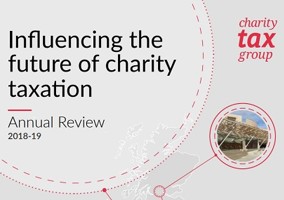Tax reliefs offered to UK charities need to be urgently overhauled, according to a report from NCVO’s charity tax commission.
The report suggests a range of measures, including many to help increase uptake of Gift Aid by donors, which it says could increase the amount donated to charities each year by hundreds of millions of pounds.
It says that currently higher earners can use their self-assessment forms to claim back the additional income tax they have paid on donations but many choose not to, while others opt not to pass it on to their chosen cause.
To improve this, the report suggests enabling higher rate tax payers to pass their tax relief onto their chosen charities more easily, potentially raising £250m more for good causes every year.
The report proposes a central database like the NHS Organ Donor Card which would enable people to complete a single, enduring universal Gift Aid declaration covering all their subsequent donations.
Its other proposals for the government to consider implementing include:
- Make offering ‘Payroll Giving’ schemes mandatory – the government should insist on employers offering this to staff, much as they have done with pension auto-enrolment.
- Remove VAT from wills that include a charitable donation – it estimates that this could lead to a further 15,000 charitable legacies a year.
- Consult on extending business rates relief to wholly-owned trading subsidiaries.
- Requiring charities with annual revenue of over £1m to publish detailed information in their annual reports about the money they receive from tax reliefs, in order to build public trust.
- Simplify VAT rules on facilities, equipment and buildings shared with other organisations, which currently mean many charities pay out money they cannot recover.
The report also calls for HMRC to provide guidance to public bodies so they can tell charities the VAT status of any grants and contracts they give to them. It says this would save many charities significant resources trying to do this for themselves.
Longer-term proposals
The report also puts forward some longer-term proposals for the government to consider.
It says a comprehensive review of VAT for charities could address systemic anomalies, improve efficiency and increase charitable activity.
The report calls on the government to review business rates relief, which it says currently benefits certain charities disproportionately.
And it urges more research into Gift Aid, which it also says currently tends to favour certain types of charities.
Sir Nicholas Montagu, chair of the commission, said: “With people giving by text message and contactless payment, and with many donors themselves increasingly mobile, we need a system fit for the digital age if we are not to see the UK’s natural generosity held back.
“The charity tax commission’s recommendations could help bring the tax treatment for charitable giving into the 21st century and result in a huge increase in the amount of money available for good causes.
“Yet none of these proposals should involve significant extra public spending or lost revenue. It’s the right time to get on with this.”
NCVO convened the commission in autumn 2017 and carried out a consultation in 2018, receiving 121 written responses.
Reaction
CTG: ‘Reliefs must treat charities equally’
John Hemming, chair of the Charity Tax Group (CTG), said: “Establishing the Commission was a welcome initiative as it has helped shine the spotlight on the highly-complicated tax regime facing the charity sector.
“The report usefully identifies that some of the tax rules under which charities operate actually defeat the purpose of the legislation and we welcome the call for tax administration and legislation to keep pace with technological advances - something that CTG has been advocating for some time.
“We were disappointed that the Commission felt it had to limit itself to fiscally-neutral proposals as moving money from one pocket to another in the same pair of trousers when you have outgrown the trousers is a problem still to be resolved.
“The evidence strongly suggests that the added socio-economic value of freeing charities from some of the tax burdens that they face would more than outweigh any additional cost of reliefs as any additional money released would be invested in providing additional facilities and services.
“CTG cautions against any attempt to limit reliefs to particular types of charities: not treating charities equally jeopardises the independence of the sector - something to be avoided at all costs.”
CAF: ‘Prospective prime ministers should take note’
John Low, chief executive of CAF, said: “Harnessing technology to make it easier to claim Gift Aid and offering regular payroll giving to all employees could be valuable boost to our culture of charitable giving.
“The many charities that make such a difference to millions of lives need our support now more than ever, and Sir Nick Montagu’s charity tax commission should be commended for making practical, positive proposals for supporting giving that should be easy for government to implement.
“The proposal to divert higher rate tax to charities needs very careful thought because people’s tax affairs are rightly private. We all aspire to increase the amount of funds available for charities, but must avoid unintended consequences that might discourage people from giving or undermine the relationship between charities and their supporters.
“At a time when those bidding for the keys to Number 10 are offering support for many parts of the economy, they should remember that simple, low cost changes to the tax system can make a major difference to organisations working with the most vulnerable in society, and to those who support them through donations.
“The generous tax reliefs that charities enjoy in our country are so much more than a mere policy mechanism. They are a profound indication of our support for the charities and civil society that play a vital role in our democracy and help make our country what it is today.”
CFG: ‘Should not limit more ambitious proposals’
Roberta Fusco, director of policy and engagement at CFG, said: “CFG welcomes the publication of the Charity Tax Commission report and was pleased to have contributed. Many of the recommendations contained in the report present positive steps forward to bring the tax treatment for charities up to date and begin to address some of the challenges which require a longer term approach.
“CFG especially welcomes the ‘short term’ recommendation to raise awareness of Gift Aid and for reform of Gift Aid rules to enable higher rate tax payers to pass their relief on to charities. We would have liked to see the proposal to extend business rate reliefs to wholly owned charity trading subsidiary companies go further to allow charities to undertake all trading without the need to set up a subsidiary company.
“With continued economic uncertainty and a changing political landscape, these recommendations while helpful, should not limit civil society from making more ambitious proposals, in-keeping with the principle that that money given for public benefit should not be taxed.”
Remember A Charity: ‘Proposals on legacies welcome’
Rob Cope, director of Remember A Charity, said: “We know that the current inheritance tax breaks are a powerful motivator for professional advisors to raise the option of legacy giving with clients and to encourage people to give, but they are only available to a minority of the public.
“To normalise legacy giving, we need to create a more level playing field and ensure that legacy giving is not something reserved for the wealthiest in society, but something that we are all encouraged to do.
“Introducing a VAT exemption on charitable wills would benefit every supporter, encourage legacy giving and ensure that charitable bequests are considered every time somebody writes a will.
“The key to growing legacy giving is driving consideration and conversation. Fiscal incentives such as our VAT proposal have huge potential to be a powerful lever for change, helping charities and advisors to become louder about legacies.”
ACF: ‘Look forward to next steps’
Max Rutherford, head of policy at the Association of Charitable Foundations (ACF), said: “We are pleased to see the Charity Tax Commission recognise the immense value of charitable tax relief as part of a diverse and pluralist civil society, echoing comments made in our own response to the Commission’s call for evidence.
“Foundations are at the heart of civil society, and, like all charities, are supported by tax reliefs to deliver their charitable objectives as well as their distinct collective impact.
“We were grateful to be given the opportunity to engage with commissioners by partaking in the reference group, and we look forward to seeing what steps are taken next in pursuit of an improved charity tax system.”
Government: 'No plans to make changes'
A government spokesperson said it would consider the report as part of its regular policy-making process.
They said: “We are committed to supporting the vital work of charities in the UK, which is why we provided the charities and their donors with over £5 billion of tax reliefs last year.
“We constantly keep tax reliefs under review but have no plans to make changes at this time.”
|
Related articles











